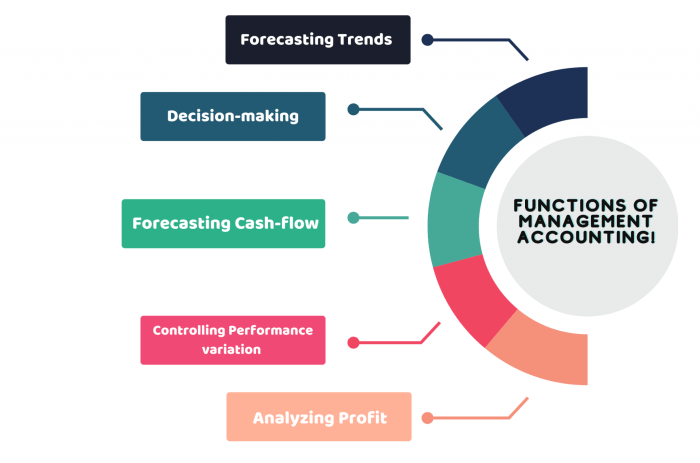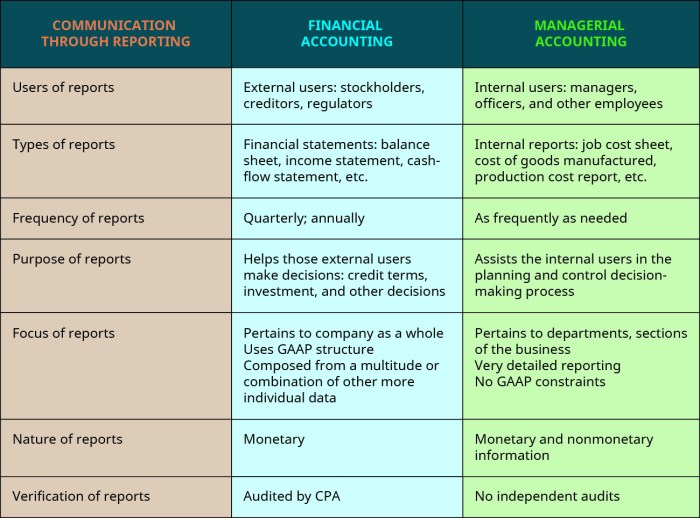Which of the following is false regarding managerial accounting information – In the realm of business decision-making, managerial accounting information plays a pivotal role. However, certain misconceptions and false notions surround this critical data, obscuring its true nature and significance. This article delves into the nuances of managerial accounting information, separating fact from fiction and illuminating the essential truths that guide its effective utilization.
Managerial accounting information serves as the backbone of informed decision-making within organizations. Unlike financial accounting, which focuses on external reporting, managerial accounting provides internal stakeholders with timely, relevant, and tailored information to support their strategic and operational choices.
Understanding Managerial Accounting Information

Managerial accounting information is financial and non-financial data used by managers within an organization to make informed decisions. Its purpose is to provide insights into the company’s performance, financial position, and operations.
Managerial accounting information plays a crucial role in decision-making by:
- Providing timely and relevant data to support decision-making processes
- Analyzing historical and current data to identify trends and patterns
- Forecasting future financial performance and cash flows
- Evaluating the effectiveness of different business strategies
Characteristics of Managerial Accounting Information

Qualitative Characteristics, Which of the following is false regarding managerial accounting information
- Relevance: The information is pertinent to the decision-making process.
- Reliability: The information is accurate, free from material errors, and can be depended upon.
- Timeliness: The information is available when needed for decision-making.
- Understandability: The information is presented in a clear and concise manner.
Quantitative Characteristics
- Accuracy: The information is free from material errors.
- Consistency: The information is prepared using the same methods and assumptions over time.
- Verifiability: The information can be independently verified by a third party.
Limitations of Managerial Accounting Information

Managerial accounting information has certain limitations that can affect its reliability and usefulness:
- Subjectivity: Some information is based on estimates and assumptions, which can lead to bias.
- Incompleteness: Not all relevant information may be available or captured.
- Timeliness: The information may not be available in time for decision-making.
- Cost-benefit considerations: The cost of gathering and analyzing the information may outweigh its benefits.
Common Misconceptions about Managerial Accounting Information

There are several common misconceptions about managerial accounting information:
- Managerial accounting information is only used for internal purposes.It can also be used for external reporting, such as to shareholders and creditors.
- Managerial accounting information is not regulated.It is subject to the same accounting standards as financial accounting information.
- Managerial accounting information is always accurate.It is subject to the same limitations as any other type of accounting information.
Ethical Considerations in Managerial Accounting: Which Of The Following Is False Regarding Managerial Accounting Information
Ethical considerations are important in managerial accounting because the information can be used to make decisions that have a significant impact on the organization and its stakeholders:
- Objectivity: Accountants should be objective and unbiased in their reporting.
- Confidentiality: Accountants should maintain the confidentiality of sensitive information.
- Integrity: Accountants should act with integrity and honesty.
Applications of Managerial Accounting Information
Managerial accounting information is used in a variety of applications, including:
- Budgeting: Setting financial goals and targets.
- Cost accounting: Determining the cost of products and services.
- Performance evaluation: Measuring the effectiveness of different business units and managers.
- Decision-making: Supporting managers in making informed decisions.
Q&A
What is the primary purpose of managerial accounting information?
Managerial accounting information is designed to support internal decision-making within an organization.
Is managerial accounting information subject to the same regulations as financial accounting information?
No, managerial accounting information is not bound by the same external reporting standards as financial accounting information.
Can managerial accounting information be used to evaluate an organization’s financial performance?
While managerial accounting information can provide insights into an organization’s financial health, it is primarily focused on supporting internal decision-making rather than external reporting.